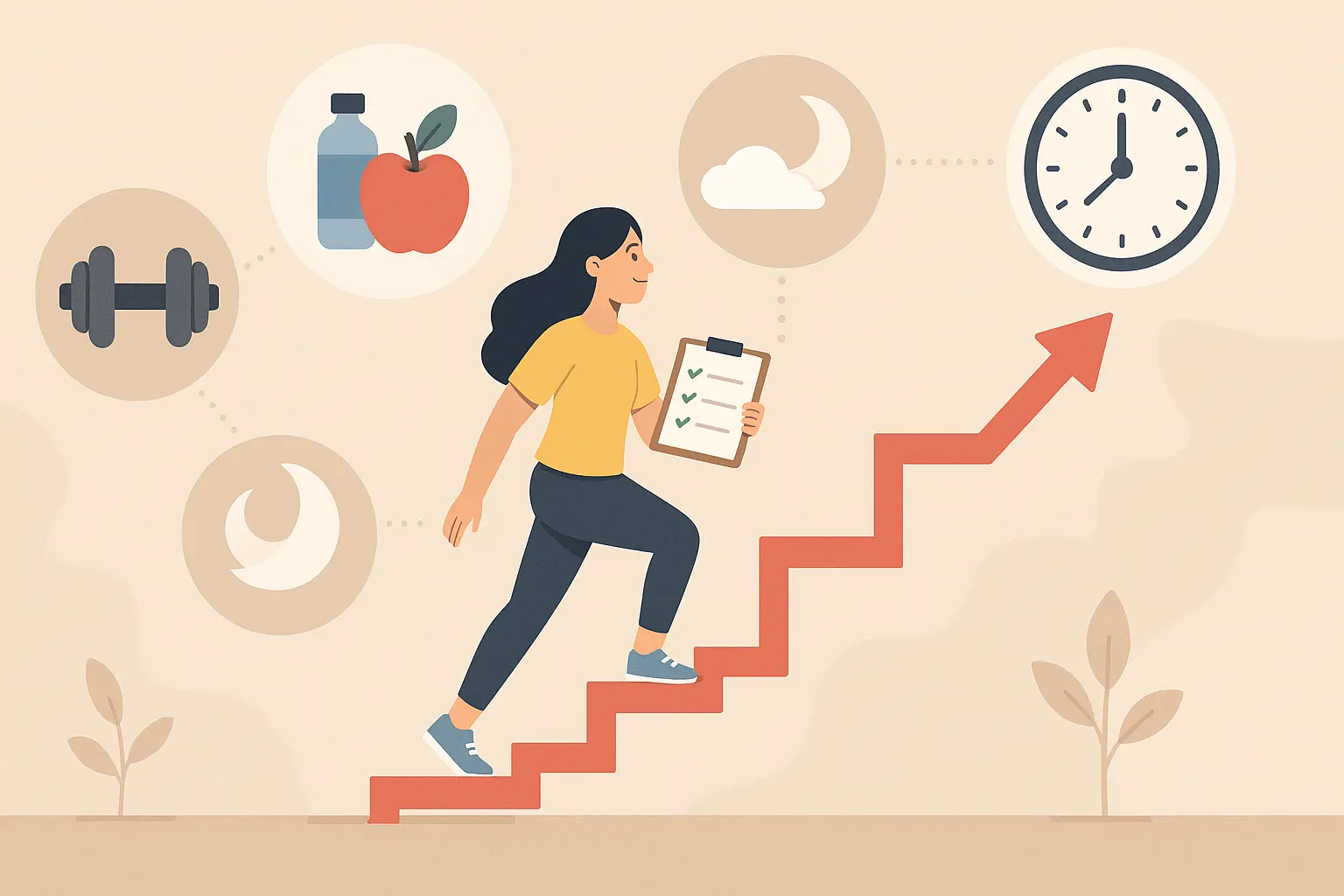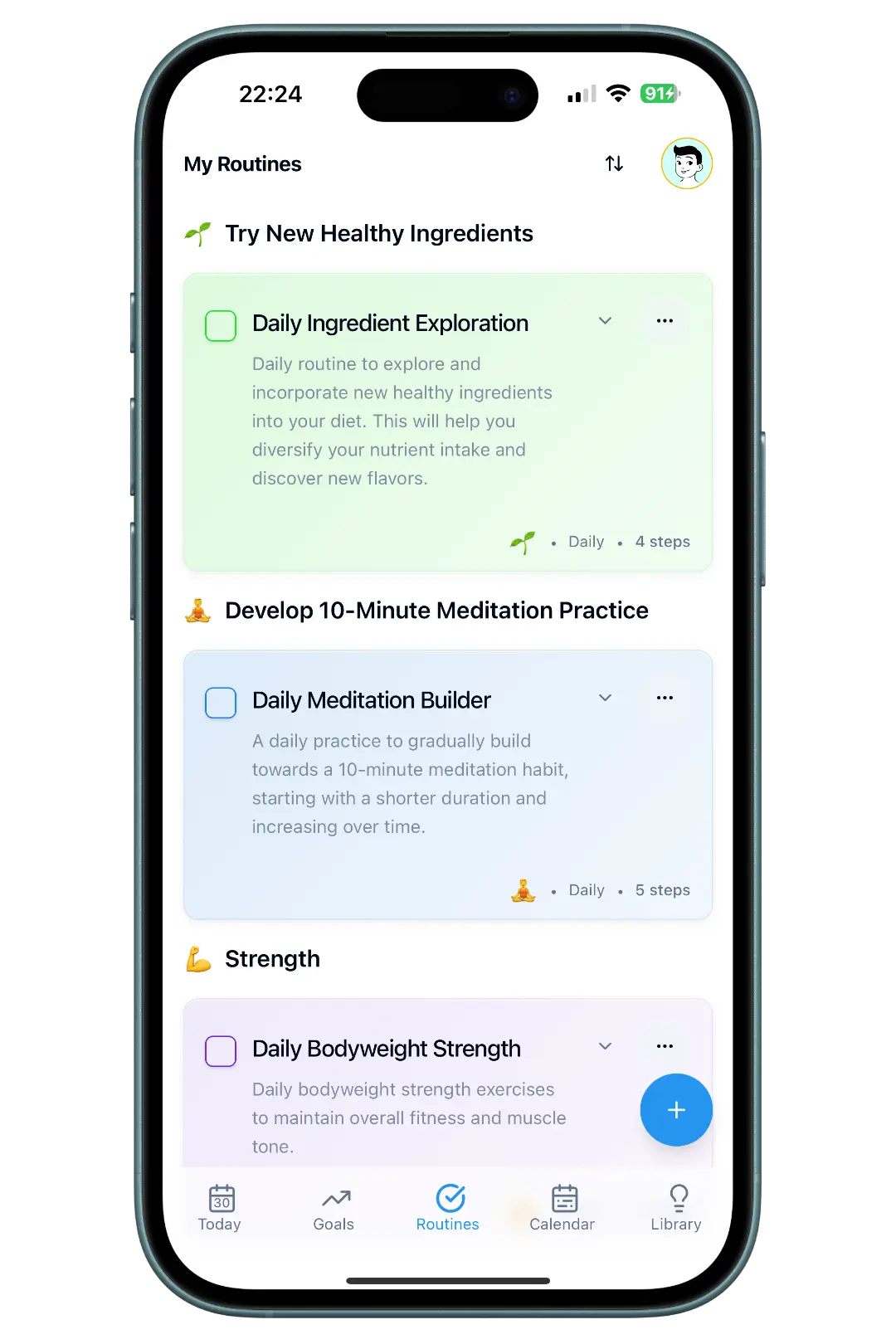
Making Healthy Habits Effortless: Your Step-by-Step Implementation Guide
April 30, 2025
Imagine waking up and automatically drinking water, moving your body, and eating well—without thinking, forcing, or relying on motivation. This isn't fantasy; it's the natural result of proper habit design. Here's your complete guide to making healthy habits as automatic as brushing your teeth.
The Effortless Equation
Effortless habits = Clear trigger + Tiny action + Immediate reward + Consistent environment
Most people focus only on the action ("I need to exercise more") while ignoring the system that makes action automatic. Let's fix that.
Phase 1: Foundation Setting (Week 1-2)
Step 1: Choose Your Starting Habit
Select ONE habit using these criteria:
- Takes less than 2 minutes to complete
- You can do it every day regardless of circumstances
- Connects to your identity ("I am someone who moves daily")
- Has clear success criteria (measurable and specific)
Examples:
- Drink one glass of water upon waking
- Do 5 squats after brushing teeth
- Eat one vegetable with lunch
- Take 3 deep breaths before each meal
Step 2: Design Your Trigger
The most reliable triggers are existing habits you already do consistently:
Time-based triggers:
- "After I wake up, I will..."
- "Before I eat lunch, I will..."
- "When I close my laptop, I will..."
Location-based triggers:
- "When I enter the kitchen, I will..."
- "When I sit at my desk, I will..."
- "When I get in my car, I will..."
Step 3: Remove All Friction
Make your new habit easier than NOT doing it:
Physical friction removal:
- Keep water bottle filled and visible
- Leave workout clothes laid out
- Pre-cut vegetables in clear containers
- Put vitamins next to coffee maker
Mental friction removal:
- Choose stupidly simple starting actions
- Plan exactly when and where you'll do it
- Decide what you'll do if you're interrupted
Step 4: Design Immediate Rewards
Your brain needs instant gratification to build the habit loop:
Natural rewards:
- Notice how water makes you feel more alert
- Enjoy the energy boost from movement
- Appreciate the accomplishment feeling
- Track your wins in ProgressMade
Artificial rewards:
- Play your favorite song after completing the habit
- Put a dollar in a "reward jar" after each completion
- Give yourself a small treat or privilege
- Share your win with an accountability partner
Phase 2: Automation Building (Week 3-6)
Step 5: The 2-Minute Rule Expansion
Once your tiny habit feels automatic (usually 1-2 weeks), slowly expand:
Week 3: 1 glass of water → 2 glasses
Week 4: 5 squats → 10 squats
Week 5: 1 vegetable → 1 vegetable + fruit
Week 6: 3 breaths → 5 breaths or full minute
Step 6: Environmental Optimization
Your environment should make the right choice inevitable:
Visual cues everywhere:
- Workout clothes visible in bedroom
- Healthy snacks at eye level in fridge
- Water bottles in every room you frequent
- Books instead of phone by your bed
Remove temptations:
- Hide unhealthy foods in opaque containers
- Put phone in another room during focus time
- Delete apps that compete with your health goals
- Create "friction" around bad choices
Step 7: Stack and Chain
Once one habit is automatic, attach new habits to it:
Example progression:
- Week 1-2: Drink water after waking
- Week 3-4: Drink water → 5 squats after waking
- Week 5-6: Drink water → squats → 2-minute stretching after waking
- Week 7-8: Full morning routine on autopilot
Step 8: Track Systematically
Use ProgressMade to identify patterns and maintain motivation:
Daily tracking:
- Mark habit completion immediately after doing it
- Note energy levels and mood
- Track how you feel before vs. after the habit
Weekly reviews:
- Analyze your consistency patterns
- Identify when you're most/least likely to succeed
- Adjust your system based on data
Phase 3: System Optimization (Week 7-12)
Step 9: Failure-Proof Your System
Plan for obstacles before they happen:
If-then scenarios:
- If I'm running late, then I'll do 2 squats instead of 5
- If I'm traveling, then I'll do bodyweight exercises in my hotel room
- If I'm stressed, then I'll do my breathing exercise for 30 seconds instead of 5 minutes
Comeback protocols:
- Missing one day: resume immediately tomorrow
- Missing two days: do simplified version to rebuild momentum
- Missing a week: restart with original tiny habit
Step 10: Identity Reinforcement
Strengthen the internal narrative that supports your habits:
Daily identity statements:
- "I am someone who takes care of their body"
- "I am someone who prioritizes their health"
- "I am consistent with my wellness routine"
Evidence collection:
- Use ProgressMade to see your streak building
- Notice compliments from others about your energy
- Track improvements in how you feel physically and mentally
Step 11: Social Integration
Make your habits socially supported and reinforced:
Accountability systems:
- Share daily wins in ProgressMade or with friends
- Find a habit buddy who's building similar routines
- Join online communities focused on your specific goals
Family integration:
- Include family members in your habits when possible
- Model healthy behaviors for children naturally
- Create shared household systems that support everyone's health
Advanced Automation Strategies
The Domino Effect
Design habits that naturally trigger other positive behaviors:
Movement domino: Morning walk → Feel energized → Choose healthier breakfast → Have productive morning Hydration domino: Water first thing → Feel alert → Skip morning caffeine crash → Better sleep that night
The Environment Cascade
Create environments where multiple healthy choices become automatic:
Kitchen setup: Fruits visible → Water filter accessible → Cooking tools ready → Healthy meal prep easier Bedroom setup: No screens → Books available → Comfortable temperature → Better sleep hygiene
The Minimum Viable Day
Design the smallest possible version of your routine for difficult days:
Ultra-minimal health day:
- 1 glass of water
- 30 seconds of movement
- 1 healthy food choice
- Track completion in ProgressMade
Troubleshooting Common Automation Failures
"The Habit Feels Forced"
- Make it smaller and easier
- Check if your trigger is reliable
- Add more immediate reward
- Ensure it connects to your deeper why
"I Keep Forgetting"
- Strengthen your environmental cues
- Improve your reminder systems
- Attach to a stronger existing habit
- Use ProgressMade notifications strategically
"Motivation Keeps Fluctuating"
- Focus on systems, not motivation
- Track progress visually to maintain momentum
- Remember: discipline creates motivation, not the other way around
- Celebrate consistency over intensity
Your 30-Day Effortless Habit Challenge
Week 1: Choose one tiny habit and establish the basic loop
Week 2: Optimize environment and strengthen triggers
Week 3: Begin gradual expansion and add tracking systems
Week 4: Plan for obstacles and build comeback protocols
The Long Game: Beyond 30 Days
After 30 days of consistent practice, you'll notice:
- Automatic execution: You do the habit without thinking
- Identity shift: You see yourself as someone who does healthy things
- Ripple effects: One good choice leads to others naturally
- Resilience: You bounce back quickly from missed days
Remember: The goal isn't perfection—it's building a system so robust that healthy choices become the path of least resistance.
Start with one tiny habit today. Make it so easy you can't fail. Track it in ProgressMade. Let automation do the heavy lifting while you enjoy the benefits of effortless health.
Your future self will thank you for making the hard things easy.
